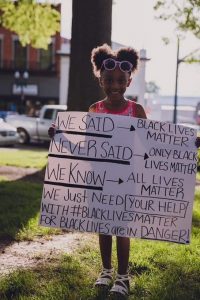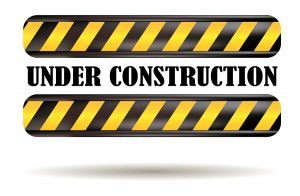If You Are Newer To Inclusive Events
It is our job to educate ourselves on these topics.
It is not the job of people from marginalized communities (People of Color, (POC), Lesbian, Gay, Bisexual, Transgender, Queer, Asexual, (LGBTQA), Disabled, Bigger, Older, etc to teach us, answer all the questions, or help us through the emotional upsets that often come from growing and looking at things in a new way. There are definitions and introductory discussions below.
Often, growing can be painful. Looking at the ways others have been treated and ways we may have been part of that bad treatment (by directly doing something, or by not speaking up) and ways we may have benefited from the way society valued certain traits we had and devalued traits others had… That takes courage.
Like most new things, often, we’ll stumble and be awkward and get things wrong at first. Opening our eyes and seeing painful truths is challenging.
The more you practice, the better you’ll get at this. And you’ll discover new connections and freedoms… For yourself and for others.
It is important to not be performative about inclusivity. That means it is our job to educate ourselves and do the work to counter racism, sexism, homophobia, transphobia, sizeism, beautism, when we see it. Saying “But I’m not a racist,” is not countering racism. Racism and the other “isms” are deeply embedded in our society and we all need to identify and work to end them.
This is ongoing work. There is so much to learn. So many unconscious beliefs and habits that we can examine and upgrade. The beautiful part is that we can support each other and grow as a community as well… Creating a space where people are valued (and know they are valued) as humans connecting with one another and being present with each other as we are… Rather than just interacting with outdated and false stories of who people are.
What is your no harassment policy? TheIntimacyDojo is committed to offering experiences as free from harassment as we can make it regardless of gender, sexual orientation, disability, physical appearance, age, race, size, religion, nationality, or social class. We do not tolerate harassment of participants or staff in any form.
- Anyone violating these rules may be expelled from the event without a refund at the discretion of the organizers.
- We may work with individuals who violate this policy in an accountability process.
- We also reserve the right to ban individuals who violate this policy from our events temporarily or permanently, depending on the severity of the incident and the level of harm.
These events are designed to be “brave spaces” where you can challenge yourself, lean into your growth edges, feel vulnerable, and empower yourself to learn. Feeling unsafe because you are growing and pushing your own edges is not the same as being harassed.
Harassment includes offensive verbal comments related to any characteristics mentioned above, deliberate intimidation, stalking, following and failing to respect someone’s no, unwelcome photography or recording, sustained disruption of talks or other events, inappropriate physical contact, and unwelcome attention.
“But, All Lives Matter” Many well-meaning people are saying this phrase when they hear “Black Lives Matter.”
When we say Black Lives Matter, we are not saying that we don’t value all lives. Just like when we say “Save the Rainforest” we’re not

Photo taken by Andras Jones Image of a young black girl with ponytails and sunglasses standing outside holding a sign that says: We Said: Black Lives Matter. Never Said: Only Black Lives Matter. We Know: All Lives Matter. We Just Need Your Help with #BlackLivesMatter for Black Lives are in DANGER!
advocating getting rid of all the other forests. We’re drawing focus on the lives (or forests) that are in critical danger at this time.
Another analogy… Imagine your neighbor’s house was on fire. People might be saying “Save this house!” Would you say, “But all houses matter!”? Wouldn’t your neighbor be pretty pissed off? For good reason? You’d be deflecting attention from the endangered house.
Please do not counter someone saying “Black Lives Matter” with “All Lives Matter.” It deflects from the harm being done to People of Color.
As a number of beautiful memes say on Facebook: When We say Black Lives Matter, We never said all lives didn’t matter… We Know All Lives Matter. We just need to focus on Black Lives since they are in danger.
Here is a resource I found useful that can help you understand and explain this to others. Another is here.
What about “Blue Lives Matter”? When people counter the phrase “Black Lives Matter” with “Blue Lives Matter” and share that the police are risking their lives, this again deflects from the harm being done to People of Color. When people say “Black Lives Matter” it doesn’t mean there aren’t good humans on the police force, or that their lives don’t matter. It means that some people on the police force are treating People of Color very differently and causing harm, including killing Black people in terrible ways. There is also systemic racism in many of federal, state and local laws and organizations. Saying “Blue Lives Matter” when someone says “Black Lives Matter” is similar to telling a person whose house is on fire that the house down the street matters and ignoring the fire… When the house down the street is owned by someone who either may be starting the fires or supporting the arsonist.
A resource that might be useful is here.
What about fetishizing people? We welcome all consent-minded humans to our events (age minimums are set for some events for legal reasons). Please do not fetishize or objectify people with different attributes. It is not okay to treat people as if they are only a skin color, a size, an ethnicity, ability or the like. As Maiysha Kai says in the linked article: “Treat me like a human being entitled to the same rights and protections as anyone else.” Useful information can be found here.
“Reducing a marginalized group or individual to a set of characteristics like personality, attitudes, and body types is, in fact, racist – even if it’s meant to be a compliment.” ~ Breeshia Wade
Treat people like individuals who are worth getting to know, not objects to be experienced. This is valuable whether you’re at a The Intimacy Dojo event or not.
For example, telling a larger woman-identified person that you like fat people is objectifying. It signals that you only care about her fat, and not about her as a person with dreams, wants, and a unique personality. Telling a larger woman-identified person that you enjoy her laugh and think her curves are sexy is signaling that you are interested in her as a person AND appreciate her body.
Some definitions that may be helpful
Marginalized: Person, group, or concept treated as insignificant, inferior or unimportant.
Privilege: A special right, advantage, or access available only to a person or group based on race, age, gender, sexual expression, size, disability, beauty, and other characteristics. Privilege is often invisible to those having it… They may not realize that other people do not find achieving what they have as easy and attainable as they do.
Centering: Putting in the center, in the spot of focus and attention. Please note how many images have the white male, pretty young cis-female, etc in the center as the focus of the other people. People with privilege are often used to being centered and will take the stage and silence others without realizing it.
White Fragility: Unwillingness to face the discomfort and defensiveness on the part of a white person when confronted by information about racial inequality and injustice. Please note that the white person will often say “this is too painful,” or “this is too much to face,” as a reason for avoiding conversations and learning more… While POC have no escape from living in a world that is racists and harming them.
BIPOC: Black and Indigenous people of color
Fetish: A form of sexual desire linked to an abnormal degree to a particular object, item of clothing, part of the body, etc. Is problematic when people objectify humans and pursue them as objects. (Fat people, POC, Asian women, etc.,)
Objectify: Degrade to the status of a mere object. Ignore a person as someone with boundaries, wants and needs of their own, and treat them as a non-thinking being that can gratify needs.
Implicit Bias: Unexamined and unconscious attitudes or stereotypes that affect our understanding, actions, and decisions.
Tokenism: making only a shallow/image-conscious effort to appear inclusive, especially by including a few people from marginalized groups in order to give the appearance of sexual or racial diversity. Including someone because of their gender, race, gender identity, size, disability only because of that identifying character, rather than what they bring to the event.
Performative: Doing something to appear inclusive without doing the actual work. For example, posting a list of resources that you haven’t read to look like you care about racism, but not speaking up when someone says something racist and only including cis-white male able-bodied speakers.
Trans: (short for Transgender) A person whose sense of personal identity and gender does not correspond with the sex they were assigned at birth.
Please note:
Trans women are women.
Trans men are men.
At our events we invite people to share their pronouns on their nametags (in-person events) and after their name (in Zoom). Please use the pronouns people share when talking to them or referring to them. If someone doesn’t have them on their nametag or next to their name in Zoom, we encourage you to ask them what pronouns they use.
Cis: (Short for Cisgender) A person whose sense of personal identity and gender corresponds with the sex assigned at birth.
Colonization/Colonisation: Process by which those in power dominate and controls resources, laws, and those not in power to systemically (consciously or unconsciously) give advantage, control, and the focus of attention to those in power. Colonialism refers to the situation where the people in power want to maintain their power and authority over others, and do so in ways that give privilege and special benefits to those in power while downplaying and discrediting marginalized groups.
“White-washing” history where the contribution and struggles of non-white people are erased and the focus on contributions white male-identified people have made and ignoring contributions by women-identified, LGBTQA+, BIPOC, and other marginalized individuals are examples.
Laws, policies, and attitudes that enforced and encouraged segregation and gave advantage to white home buyers is another example.
Resources:
Oprah Discusses Racism With David Oyelowo, Ava DuVernay
More Advanced Reading:
There Is No Such Thing As A White Ally
Love Is Not Colorblind– an excellent book by Kevin A. Patterson and Ruby Bouie Johnson on Racism in Polyamorous and other alternative communities.
 More is being added and adjusted as this is reviewed. This is a work in progress. Constructive Feedback is welcomed. Hate speech is not.
More is being added and adjusted as this is reviewed. This is a work in progress. Constructive Feedback is welcomed. Hate speech is not.